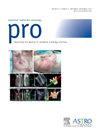Treatment Terminations During Radiation Therapy: A 10-Year Experience
IF 3.4
3区 医学
Q2 ONCOLOGY
引用次数: 0
Abstract
Purpose
Patients undergoing radiation therapy may terminate treatment for any number of reasons. The incidence of treatment termination (TT) during radiation therapy has not been studied. Herein, we present a cohort of TT at a large multicenter radiation oncology department over 10 years.
Methods and Materials
TTs between January 2013 and January 2023 were prospectively analyzed as part of an ongoing departmental quality and safety program. TT was defined as any premature discontinuation of therapy after initiating radiation planning. The rate of TT was calculated as a percentage of all patients starting radiation planning. All cases were presented at monthly morbidity and mortality conferences with a root cause reviewed.
Results
A total of 1448 TTs were identified out of 31,199 planned courses of care (4.6%). Six hundred eighty-six (47.4%) involved patients treated with curative intent, whereas 753 (52.0%) were treated with palliative intent, and 9 (0.6%) were treated for benign disease. The rate of TT decreased from 8.49% in 2013 to 3.02% in 2022, with rates decreasing yearly. The most common disease sites for TT were central nervous system (21.7%), head and neck (19.3%), thorax (17.5%), and bone (14.2%). The most common causes of TT were hospice and/or patient expiration (35.9%), patient choice unrelated to toxicity (35.2%), and clinician choice unrelated to toxicity (11.5%).
Conclusions
This 10-year prospective review of TTs identified a year-over-year decrease in TTs as a percentage of planned patients. This decrease may be associated with the addition of root cause reviews for TTs and discussions monthly at morbidity and mortality rounds, coupled with departmental upstream quality initiatives implemented over time. Understanding the reasons behind TTs may help decrease preventable TTs. Although some TTs may be unavoidable, open discourse and quality improvement changes effectively reduce TT incidents over time.
放射治疗期间的治疗终止:十年经验
目的:接受放射治疗的患者可能会因各种原因终止治疗。关于放疗过程中治疗终止(TT)的发生率尚未进行研究。在此,我们介绍了一个大型多中心肿瘤放疗科 10 年来的治疗终止队列:我们对 2013 年 1 月 1 日至 2023 年 1 月 1 日期间的 TT 进行了前瞻性分析,这是科室质量与安全计划的一部分。TT定义为开始放射计划后任何过早中断治疗的情况。TT发生率按开始放射计划的所有患者的百分比计算。所有病例都在每月的发病率和死亡率(MM)会议上进行了病因审查(RCA):结果:在 31199 个计划疗程中,共发现 1448 例 TT(4.6%)。其中有 686 例(47.4%)患者接受了治愈性治疗,753 例(52.0%)患者接受了姑息性治疗,9 例(0.6%)患者接受了良性疾病治疗。TT率从2013年的8.49%降至2022年的3.02%,且逐年下降。TT最常见的发病部位是中枢神经系统(21.7%)、H&N(19.3%)、胸部(17.5%)和骨骼(14.2%)。最常见的TT原因是临终关怀和/或患者过期(35.9%)、与毒性无关的患者选择(35.2%)以及与毒性无关的临床医生选择(11.5%):这项为期 10 年的前瞻性 TT 回顾发现,TT 在计划患者中所占的比例逐年下降。这一下降可能与针对 TT 增加了 RCA 和每月在 MM 查房中进行讨论有关,也与随着时间推移实施的科室上游质量举措有关。了解 TT 背后的原因有助于减少可预防的 TT。虽然有些 TT 是不可避免的,但公开讨论和质量改进措施可有效减少 TT 事件的发生。
本文章由计算机程序翻译,如有差异,请以英文原文为准。
求助全文
约1分钟内获得全文
求助全文
来源期刊

Practical Radiation Oncology
Medicine-Radiology, Nuclear Medicine and Imaging
CiteScore
5.20
自引率
6.10%
发文量
177
审稿时长
34 days
期刊介绍:
The overarching mission of Practical Radiation Oncology is to improve the quality of radiation oncology practice. PRO''s purpose is to document the state of current practice, providing background for those in training and continuing education for practitioners, through discussion and illustration of new techniques, evaluation of current practices, and publication of case reports. PRO strives to provide its readers content that emphasizes knowledge "with a purpose." The content of PRO includes:
Original articles focusing on patient safety, quality measurement, or quality improvement initiatives
Original articles focusing on imaging, contouring, target delineation, simulation, treatment planning, immobilization, organ motion, and other practical issues
ASTRO guidelines, position papers, and consensus statements
Essays that highlight enriching personal experiences in caring for cancer patients and their families.
 求助内容:
求助内容: 应助结果提醒方式:
应助结果提醒方式:


